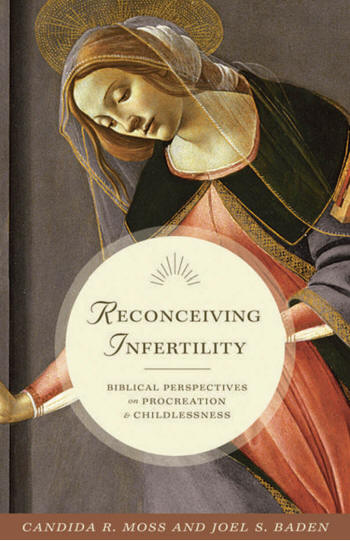Reconceiving Infertility:
Biblical perspectives on procreation &
childlessness
Candida R. Moss And Joel S. Baden
Princeton University Press (21
Aug 2015)
ISBN: 978-0691164830
 This
work is about a really interesting subject. Scripture associates fertility
with something good. Does this mean that Scripture condemns infertility as
a curse?
This
work is about a really interesting subject. Scripture associates fertility
with something good. Does this mean that Scripture condemns infertility as
a curse?
The authors show that the answer is not that straightforward. Certainly, there are accounts when infertility is perceived as punishment: when Abraham and Sarah entered a foreign land, all the women there became infertile (Genesis 20). However, as the authors also note, Sarah herself was infertile and there is no suggestion that she had been punished by God at that time. Even when she famously doubted that God could render her fertile, it would appear that far from punishing her, her doubts made God more determined to bring about what He had promised.
We are also told that Rebekah, although generous and worthy in the eyes of God, was also barren at one time. Then we have Rachel who was found to be barren after her marriage to Jacob. There are descriptions of other barren women who were close to God in the Bible. In the New Testament, we have Zechariah and Elizabeth who were described as "righteous before God" at a time when they were childless. So, although fertility is seen as a metaphor for God's blessings, infertility is by no means always a curse.
Even from a non-faith perspective, it would appear that what is found in the Bible strongly resonates with the teachings of the Church. Certainly, marriage must be open to the possibility of having children. But childlessness when not deliberately chosen does not make for a lesser marriage. In fact, the pursuit of some fertility treatments stands condemned.
I have difficulties with certain attempts at New Testament analogies. For example, the authors claim that "if there is a human context within which we can understand the birth of Jesus, it is the context of infertility". No, the Virgin Birth is unique. Such an analogy, even within a human context, does not hold. Mary is not a surrogate mother. She cannot be cast in the role of Hagar. While it is true that her unique child birth was without pain, it is not true that this "inevitably reinforces the idea that sin and pain are inextricably linked". I write this review on the feast of Our Lady of Sorrows.
Saint Paul did not denigrate marriage. While it is true that he asked his followers to consider celibacy, this was in the context of missionary activities often ending in martyrdom. But the Church has always taught that marriage is a sacrament.
It is also unfair of the authors to claim that when Pope Francis speaks against intentional childlessness, he is somehow condemning all childless couples.
It is a pity that two professors of theology appear not to know the difference between the Virginal Conception of Jesus and the Immaculate Conception of Mary.
There is much to agree with in this book and much to disagree with. What is beyond doubt is that the subject proves interesting and thought provoking.
Reviewed by Dr Pravin Thevathasan
